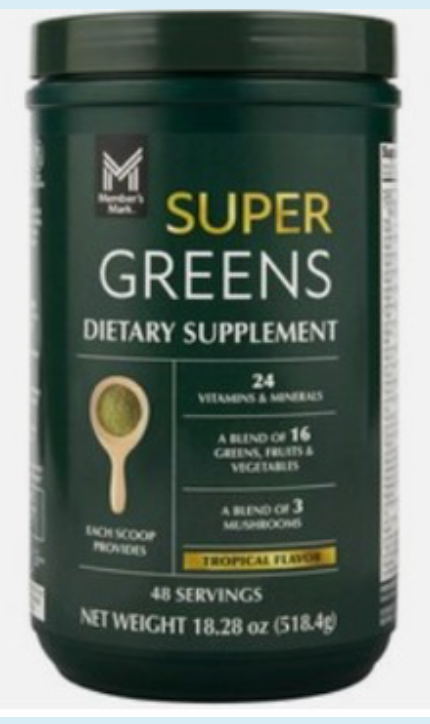The FDA and CDC are investigating a new outbreak of Salmonella Richmond infection caused by imported moringa leaf powder.
As of October 31, there are 11 confirmed outbreak patients in seven states. Three patients required hospitalization. The illnesses began between May 12 and September 4. The patients' age ranged from 13 to 65 years.
Nine out of 10 patients surveyed reported using powdered dietary supplements, according to the Centers for Disease Control and Prevention. Six of these people reported eating Member's Mark Super Greens powder. Three people reported other products containing moringa leaf powder.

The powder was sold online and in Sam's Club stores nationwide. Sam's Club has stopped distributing and selling the product. Consumers who still have this product in their homes should not eat or serve the recalled Member's Mark Super Greens Dietary Supplement Powder and should throw away this product or return it to the place of purchase. Sam's Club also contacted its customers directly to notify them of the recall.
Moringa powder was supplied to the USA by Vallon Farm Direct PVT LTD of Jodhpur, India.
The Food and Drug Administration used tracking records of organic moringa leaf powder collected from the supply chain for all eight points of sale that converged on the direct importer of organic moringa leaf powder sourced from Vallon Farm Direct PVT LTD in India.
As part of the outbreak investigation, the Virginia Department of Health collected an open sample of moringa leaf powder from the home of a sick person. The sample tested positive for salmonella and is consistent with the strain causing illness in this outbreak, according to whole-genome sequencing data, according to the CDC.
In addition, an unopened sample of Member's Mark Super Greens dietary supplement powder was collected from the home of an ill individual by the Michigan Department of Agriculture and Rural Development and analyzed by the Michigan Department of Health and Human Services. This sample tested positive for Salmonella and is consistent with the strain causing illness in this outbreak based on whole genome sequencing data.
According to the Centers for Disease Control and Prevention (CDC), the number of patients in the outbreak is likely much higher than has been identified because some people do not seek medical attention and others do not undergo specific testing for salmonella infection. The agency estimates that for every confirmed patient in a salmonella outbreak, 29 more people go undetected.
About salmonella infection
Food contaminated with salmonella bacteria usually does not look spoiled, does not smell or taste. Anyone can get salmonellosis. According to the CDC, infants, children, older adults and people with weakened immune systems are at higher risk of serious illness because their immune systems are fragile.
Anyone who has eaten any of the recalled products and experiences symptoms of salmonella infection should seek medical attention. Sick people should tell their doctors about possible exposure to salmonella bacteria because special tests are needed to diagnose salmonellosis. Symptoms of Salmonella infection can mimic other diseases, often leading to misdiagnosis.
Symptoms of a salmonella infection may include diarrhea, abdominal cramps and fever for 12 to 72 hours after eating contaminated food. Otherwise healthy adults usually get sick for four to seven days. However, in some cases, diarrhea can be so severe that patients require hospitalization.
Older adults, children, pregnant women, and people with weakened immune systems, such as cancer patients, are more likely to develop severe illness and serious, sometimes life-threatening conditions.
Some people become infected without getting sick or showing any symptoms. However, they can still transmit the infection to other people.
(To sign up for a free subscription to Safety News, click Here)








